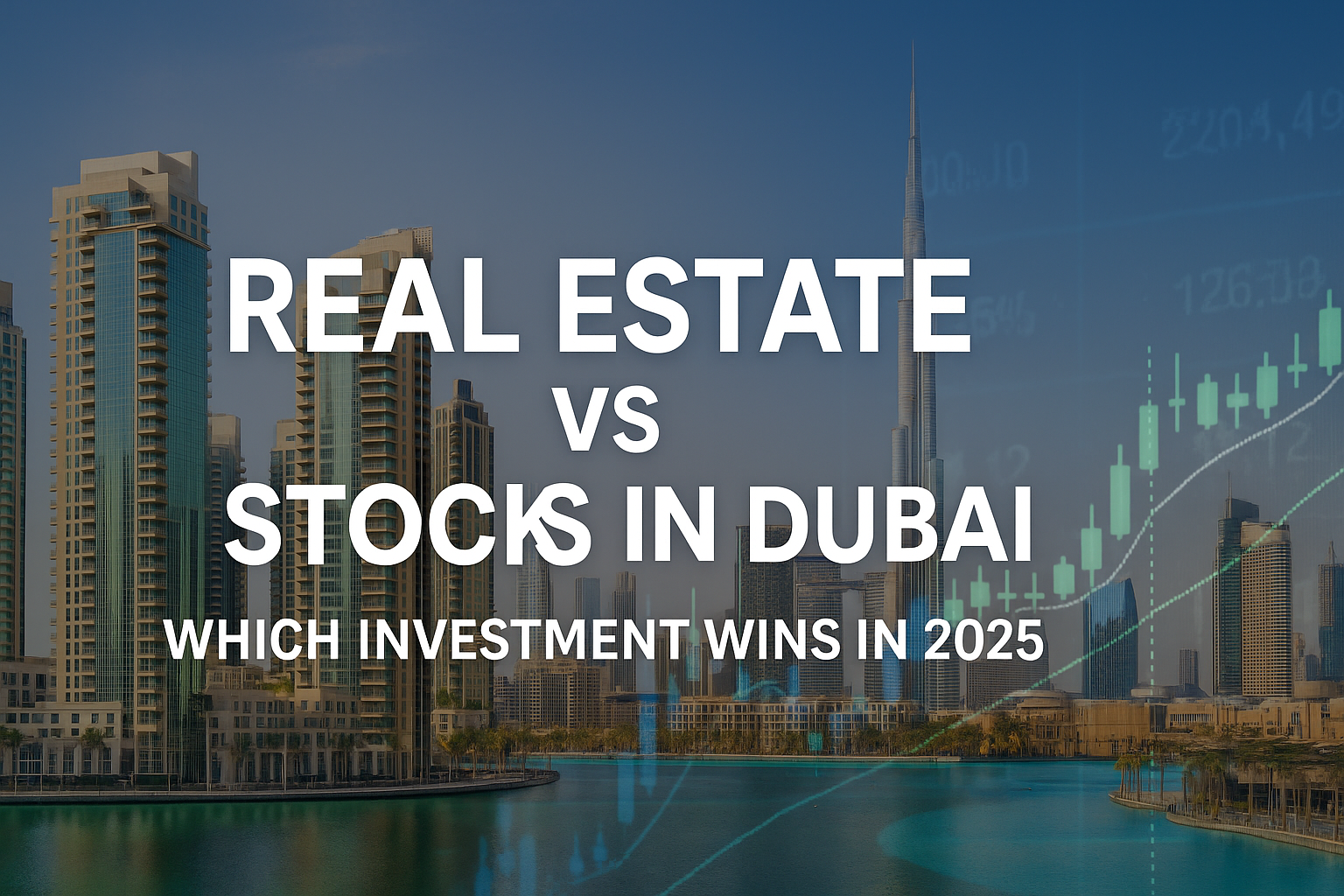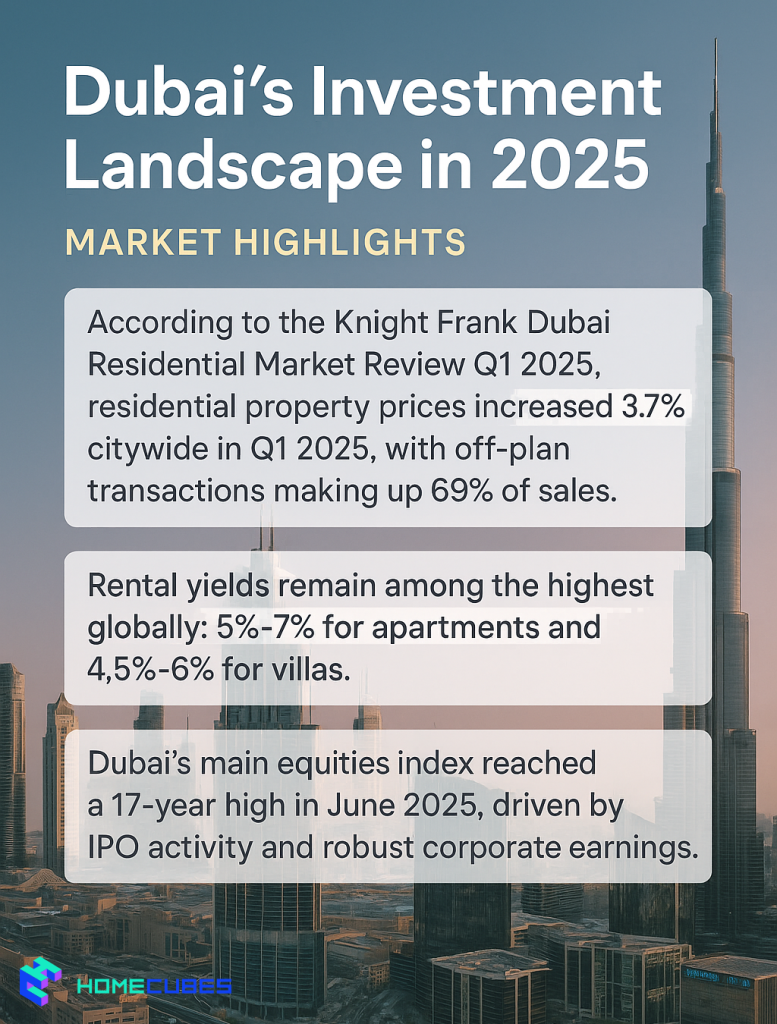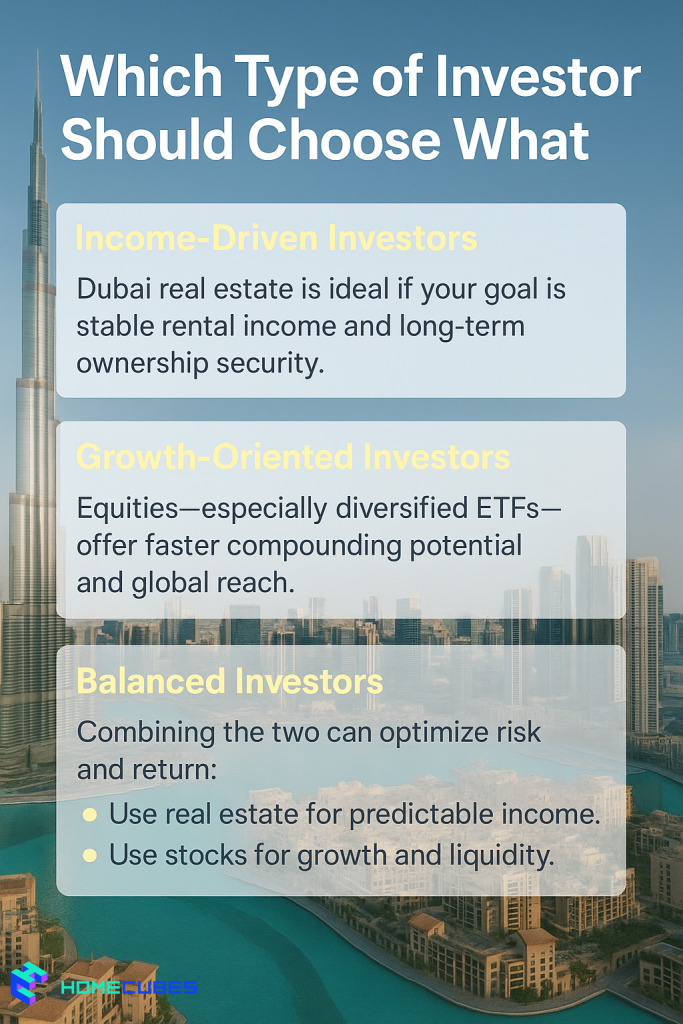

Introduction
Dubai continues to be one of the most attractive investment hubs globally, drawing in property buyers, stock traders, and institutional capital from around the world. There are quite a few advantages in early investment in Dubai property market In 2025, however, investors face a critical choice: should you invest in Dubai real estate or equities?
Each offers unique benefits and risks. Real estate provides tangible ownership and steady rental yields, while stocks deliver liquidity, diversification, and global exposure. In this guide, we explore Real Estate vs Stocks Dubai, comparing data, fees, risks, and strategies so you can decide where your money works best this year.
Dubai’s real estate sector registered an impressive $4.9bn of transactions in a single week last month.
Dubai @Land_Department recorded 3,450 sales between 17 and 21 February.
Interesting to note that the three most expensive deals took place in Dubai Canal and Palm Jumeirah.… pic.twitter.com/isaCf5FaRd
— Abbas Sajwani عباس سجواني (@Abbas_H_Sajwani) March 5, 2025
Dubai’s Investment Landscape in 2025
Dubai’s growth story continues to captivate global investors, fueled by rising demand, advanced infrastructure, and regulatory reforms designed to attract foreign capital.

Market Highlights
- According to the Knight Frank Dubai Residential Market Review Q1 2025, residential property prices increased 3.7% citywide in Q1 2025, with off-plan transactions making up 69% of sales.
- Rental yields remain among the highest globally: 5%–7% for apartments and 4.5%–6% for villas.
- Dubai’s main equities index reached a 17-year high in June 2025, driven by IPO activity and robust corporate earnings.
- Regulatory innovations like fractional ownership, expanded Golden Visa eligibility, and streamlined DLD approvals make Dubai more accessible than ever.
Why Dubai Real Estate Remains Attractive
Dubai’s property market is synonymous with wealth creation and remains a cornerstone for investors seeking stability, income, and long-term appreciation. The five year outlook from 2025 onwards for the Dubai real estate market looks bright.
Rental Yields and Capital Growth
- Apartments: Average 5%–7% gross yields, especially in high-demand zones like Dubai Marina, Downtown, and Business Bay.
- Villas: Yield slightly lower (4.5%–6%), but limited supply in premium zones drives strong price performance.
- Off-plan luxury developments are absorbing investor demand, particularly waterfront and branded residences.
Growth Drivers
- Population boom: Over 100,000 new residents relocated to Dubai in 2024, supporting demand across segments.
- Golden Visa incentives: Easier residency for investors boosts long-term ownership appeal.
- Mega-projects: Dubai Harbour, Creek Waters, and Palm Jebel Ali 2.0 continue to transform Dubai’s skyline.
Key Costs and Risks
- High upfront fees: The Dubai Land Department charges 4% registration plus 0.25% mortgage registration, trustee costs, and ongoing service charges (official DLD fee schedule).
- Liquidity issues: Selling property takes time and depends on market demand.
- Community performance risk: Mid-market apartments face oversupply challenges, while prime assets remain resilient.
Why Stocks Are Gaining Momentum
Dubai’s stock market has evolved into a mature ecosystem offering liquidity, dividend stability, and international exposure.
Dubai Equities Performance
- The Dubai Financial Market (DFM) reached a 17-year high in June 2025, reflecting growing investor confidence.
- Dividend-paying blue chips like Emirates NBD, Emaar Properties, and DEWA are attracting both local and foreign capital.
- IPOs continue to dominate headlines, with logistics, fintech, and REIT offerings achieving multiple oversubscriptions.
Access to Global Diversification
Investors in Dubai can now easily trade global equities and ETFs through local brokers. With the MSCI World Index delivering a 10-year annualized return of ~10%, equities complement Dubai’s property-focused portfolios by offering faster compounding potential.
Risks to Watch
- Short-term volatility: Prices fluctuate based on oil, global earnings, and regional macroeconomic shifts.
- Dividend inconsistency: Not all stocks deliver predictable income streams.
- Investor psychology: Emotional trading can lead to significant underperformance over time.
Real Estate vs Stocks Dubai — Side-by-Side Analysis
| Aspect | Dubai Real Estate | Stocks (UAE + Global) |
| Returns | Rental yields 5–7%; strong appreciation in premium locations | Historic CAGR 8–12% globally |
| Liquidity | Low — property sales take weeks/months | High — instant online trading |
| Risk | Lower day-to-day volatility; location-driven cycles | Higher volatility; macro-driven |
| Entry Costs | High upfront: 4% DLD + trustee + NOC fees | Low brokerage + ETF expenses |
| Diversification | Limited by asset type and geography | Multi-sector, multi-region exposure |
| Leverage | Mortgages widely available | Margin trading possible but riskier |
Fees and Hidden Costs Investors Forget
Real Estate Fees
- DLD Registration: 4% of property value (official fee breakdown)
- Mortgage Registration: 0.25% of the loan amount
- Trustee Office Fees: Typically AED 2,000–4,000
- Service Charges: Monitored via Mollak, varies by property and community
Stock Market Fees
- Total Trading Costs: On DFM, brokerage + authority + clearing + depository fees total approximately 0.275% + AED 10 per trade (official fee PDF)
- ETF Management Fees: Typically 0.05%–0.5% annually
Which Type of Investor Should Choose What

Income-Driven Investors
Dubai real estate is ideal if your goal is stable rental income and long-term ownership security.
Growth-Oriented Investors
Equities—especially diversified ETFs—offer faster compounding potential and global reach.
Balanced Investors
Combining the two can optimize risk and return:
- Use real estate for predictable income.
- Use stocks for growth and liquidity.
Case Study: Two AED 2 Million Investors
Investor A: Buys a Dubai Marina apartment for AED 2M
- Annual gross rent: AED 120,000 (~6%)
- DLD + trustee fees: AED 90,000+
- Net yield after costs: ~4.8%
- Capital appreciation forecast: 3–5% per year
Investor B: Allocates AED 2M into UAE blue-chip stocks + global ETFs
- Dividend income: ~4.5% annually
- Projected CAGR: 8–10%
- Full portfolio liquidity and instant rebalancing
Takeaway: Investor A enjoys steady rental income, while Investor B pursues faster compounding—but faces more volatility.
Mistakes to Avoid in 2025
- Focusing only on gross yields: Always account for service charges, maintenance, and vacancy.
- Overleveraging property investments: Rising rates can erode returns quickly.
- Ignoring diversification: Concentrating capital in one asset class exposes you to unnecessary risk.
- Underestimating hidden costs: Both property and equities have fee layers that impact net returns.
- Emotional trading: Reacting to short-term stock swings often damages long-term results.
Frequently Asked Questions
Is Dubai property safer than stocks?
Real estate offers lower daily volatility, but price cycles still affect returns.
What’s the minimum investment needed?
Expect at least AED 800k–1M for property. Stocks allow entry with as little as AED 1,000.
Can I invest in fractional real estate?
Yes, DLD-approved platforms now allow fractional investments starting from AED 5,000.
What are the DLD fees?
Buyers pay 2%, sellers 2%, plus mortgage registration and trustee fees.
Let’s Talk
Dubai’s investment landscape in 2025 offers world-class opportunities across both real estate and stocks. The best choice depends on your risk tolerance, investment horizon, and financial goals.
At Homecubes, we help investors navigate Dubai’s evolving markets and design data-driven, compliant strategies tailored to their needs.
Note: Homecubes is currently awaiting its VARA license and does not offer regulated services until approval.
Start planning today:
Contact Homecubes










